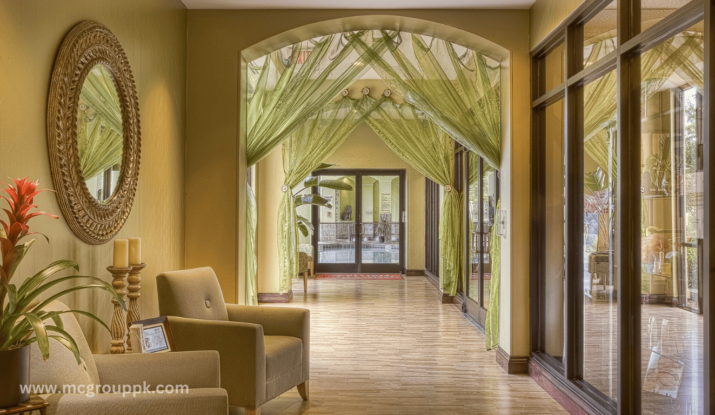Boutique hotels have gained massive popularity in recent years. But what exactly makes a hotel “boutique”? Is it the size, the vibe, or something more? Boutique hotels represent more than just a place to stay; they offer an experience.
If in the past you have ever been in a way bored with standardized offers such as hotels, then boutique hotels are exactly for such people. They incorporate friendliness, innovation, and customization to the stay to make the clients remember. Hence, whoever you are, a travel freak or a wanderlust, this article will make you comprehend every one of your doubts about boutique hotels.
Here, you’ll discover what a boutique hotel is, why they are so popular now, and how they differ from a regular hotel stay. Ready? Let’s dive in!
What Is a Boutique Hotel?
A boutique hotel is a limited-sized property that is owned and managed by an independent owner or company. While chain hotels are large, sterile, formulaic, and generic products that buyers Sus welcome by banal and interchangeable facilities, boutique hotels are all about ambiance, distinctiveness, and small scale. These properties can include elements of the local artistic direction and have a cozy atmosphere.
One important feature of boutique hotels is that all these hotels have to be unique. All individual properties are unique in concept and the experience given to every guest is not generic. There are no two boutique hotels that are the same and it is one of the attractions of boutique hotels.
Furthermore, accumulated guest experiences indicated that boutique hotels usually attract guests who want a tailored feel and involvement. Even the furniture they order on their own, down to the menu with local delicacies. All this is designed in such a way that every stay becomes unforgettable.
A Brief History of Boutique Hotels
Boutique hotels were first developed in the 1980s. Boutique hotels first appeared in London and New York. These small luxury properties aimed to offer unique concepts, unlike most traditional hotel brands. The concept of the ‘boutique style’ that these people wanted to install has been for it to be a home away from home.
When the need for people to stay in accommodation stands out from the usual have been rising, the concept of boutique hotels was bred and started to pop out worldwide. They became the symbol of modern travel. They cater to people who, unlike mass tourists, value the freedom of exploration over the limitations of packaged tours.
Contemporary boutique hotels are characterized by location, ensuring that guests experience the traditional ways of a particular region with modern comforts and novelty in architecture. Today, there are many boutique hotels available. These hotels cater to people looking to relax, whether in the city or the countryside.
Characteristics of Boutique Hotels: What Makes Them Stand Out?
Certain characteristics are general to most boutique hotels and are implied standards across the respective line of business. Below, we’ll break down their most defining features:
1. Size
Boutique hotels are normally classified as accommodations with occupancy of fewer than 100 rooms. The small size gives them a personal feel, which many large chain hotels cannot offer their guests. There are implications for providing guests with a more personal and less rushed service experience, due to a decrease in the number of people.
Small-sized hotels help in avoiding compromise of some of the key aspects in the building of this hotel as well as developments that are associated with them.
2. Chic Design
His Vision that makes the boutique hotels unique if always associated with a stylish and original look. These hotels incorporate a selection of interiors and designs such as architecture and arts by some of the best interior designers.
Small luxury hotels are mostly designed with simplicity focusing on the beauty and inspiration of modern themes. Usually, each room is different from another one, which is good having regard to most hotels’ interiors.
3. Personalized Service
One of the strengths of boutique hotels is their ability to offer clients a very highly individualized service. Employees usually recognize their visitors and go the extra mile to prepare rooms based on their client’s preferences.
Boutique hotels go the extra mile to make guests feel valued. Whether it’s delivering a birthday bouquet or recommending the best local activities, they don’t cut corners.
4. Local Culture
Most of the boutique hotels incorporate the location of the hotel. They can bring the traditional elements of the specific culture. The hotel is located in the design details, menu, and treatment of the guests. They make guests stay remarkably true to the particular environment.
These hotels rely heavily on the services of artists, chefs, and local tour guides to ensure the guests get the best information about the region.
5. Ideal Location
Boutique hotels are traditionally located in popular areas—whether it be in the center of an urban city, tucked away in the sleepy countryside, or right on the seashore. These prime locations are easy to explore and offer some of the most incredible views one could ever hope to see!
With this, it is well positioned also it guarantees that the guests get a near place to prominent events, eating places, and shopping centers.
6. Individualized Decor
Although they are small, every single room in a boutique hotel can look different from the others, creating a new experience each time. Starting with the furniture in regards to it hand made and going up to the artwork that compliments the space.
Such individuality guarantees to the guest that they not only rent a room but are in a specially designed environment.
7. Top-Notch Restaurant
Art hotel often comprises excellent quality of restaurant. Such dining places bring out regional specialties, what is produced in season, and skilled preparation as aspects of enhancing the guest’s dining experience.
The restaurant and bar offerings are just as diverse as the rooms with menu specialties that suit the general theme of the hotel and its setting.
| Characteristic | Description |
| Size | Small, under 100 rooms |
| Design | Creative and unique |
| Service | Personalized |
| Culture | Locally inspired |
| Location | Prime areas |
| Décor | Individualized touches |
| Restaurant | High-quality dining |
Boutique Hotels vs. Regular Hotels: How Do They Differ?
Personalization vs Standardization
Chain medium and full-service hotels are characterized by efficiency in that they sell standardized products in their different outlets. Other hotels can be characterized by the uniform organization of services and working with customers. Boutique hotels aim at individual approaches and selective customization of services and rooms for guests.
The other thing that boutique hotels do well is cultivate unique experiences that are usually missing in large-scale hotel chains.
Size Matters
Unlike palaces that might have hundreds of rooms for guests, boutique hotels have relatively few rooms and thus are quieter. This also enables the boutique hotel to afford to make their accommodations more personal.
Design and Atmosphere
This has the familiar appearance of a typical commercial building and is generally standardized away from any sense of identity. The miscellaneous intimate hotels are characterized by artistic and creative interiors. The target customers of boutique hotels seem to be living within an art gallery that has been professionally set up.
| Feature | Boutique Hotels | Regular Hotels |
| Size | Under 100 rooms | Over 100 rooms |
| Design | Unique and chic | Standard |
| Service | Personalized | Generic |
| Focus on Culture | High | Limited |
For those of our readers who want to immerse themselves in the sophistication of a boutique firm in Pakistan, MC Group will be the ideal choice. Well reputed for quality and professional services MC Groups have done a great work of combining luxury and the touch of local flavour. Their hotels and accommodations are perfect for corporate and leisure travelers because all their boutique hotels give you an unforgettable experience. Discover elegant decors, quality food, and the comfort of staying with family within the MC Group.
FAQs
What is the main difference between a boutique hotel and a regular hotel?
While boutique accommodation establishments aim to deliver high-quality services and distinct styles. Regular hotel enterprises tend to avoid differentiation and resort to standard formats.
How many rooms does a boutique hotel usually have?
They contain less than 100 rooms, which allows them to create a special ambiance and atmosphere.
Are boutique hotels more expensive than regular hotels?
Yes, but their value quickly offsets the price tag with an individual approach, stylish design, and meticulousness.
What kind of dining options can I expect at a boutique hotel?
Modern inviting boutique hotels often include excellent food offers represented by locally inspired restaurant menus and seasonal options.
Are boutique hotels suitable for families?
Yes, the boutique hotel business targets families as well and every family is provided with a specific package which can be a little different but interesting for all the family members.
Conclusion
What boutique hotels present is more than just a location for a place to lay one’s head. Since they are small, intimate, and specialize in individual designs, they are well suited for tourists who wish to spice up their tours. These hotels are unique in their cultural orientation and emphasis on the customer.
Whether you’re planning a vacation or a business trip, a boutique hotel can make your stay special. Next time you book accommodations, consider trying a boutique hotel – you’ll be glad you did!


